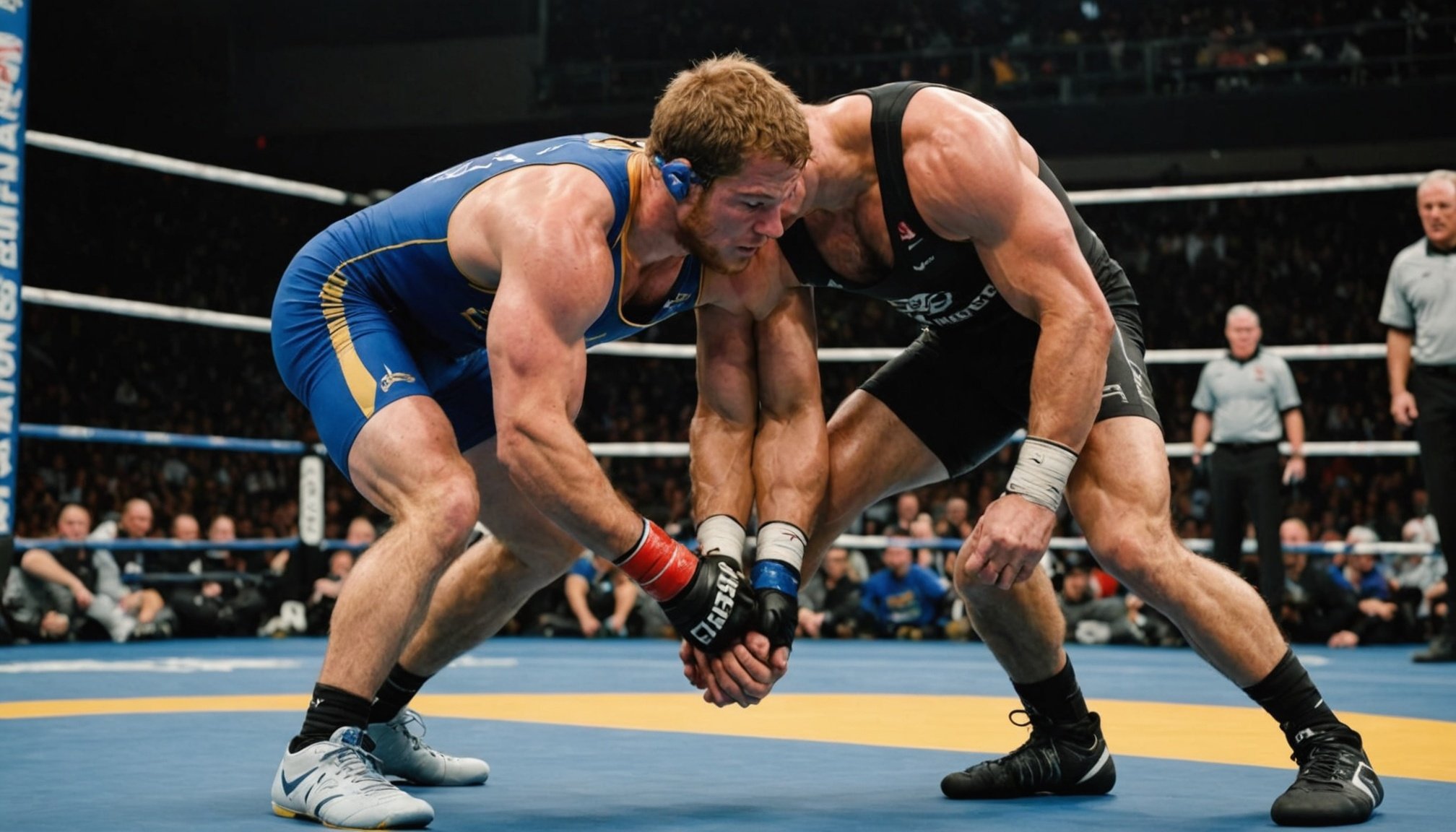Essential Dietary Changes for Wrestlers to Optimize Weight Cutting Success
For wrestlers, managing weight is a critical aspect of their training and competition preparation. The process of cutting weight, while necessary, can be daunting and potentially detrimental to health if not done correctly. Here, we will delve into the essential dietary changes that wrestlers can implement to optimize their weight cutting success, ensuring they maintain peak performance and overall health.
Understanding the Importance of Nutrition in Wrestling
Nutrition plays a pivotal role in the life of a wrestler. It is not just about cutting calories or reducing water intake; it is about fueling the body to perform at its best. Ben Askren, a former Olympic wrestler, emphasizes the importance of nutrition: “When you’re training at a high level, you need to make sure you’re fueling your body with the right foods to recover and perform optimally.”
Also to read : Top Energizing Breakfast Ideas for Your Early Morning Workouts
Macronutrient Balance
A balanced diet for wrestlers should include the right mix of carbohydrates, proteins, and fats. Here is a detailed breakdown of each macronutrient and its role:
- Carbohydrates: These are the primary source of energy for wrestlers. Focus on complex carbohydrates such as whole grains, fruits, vegetables, and legumes. These foods provide sustained energy and are rich in fiber, vitamins, and minerals.
- Proteins: Essential for muscle repair and growth, proteins should be a significant part of a wrestler’s diet. Include lean protein sources like chicken, fish, beans, and dairy products.
- Fats: While often misunderstood, healthy fats are crucial for hormone production and absorption of vitamins. Nuts, seeds, avocados, and olive oil are good sources.
Effective Weight Loss Strategies
Weight loss in wrestling is a delicate balance between reducing body weight and maintaining performance. Here are some effective strategies:
Also read : Top Footwork Drills Every Squash Player Should Master for Peak Performance
Intermittent Fasting
Intermittent fasting has gained popularity among athletes, including wrestlers. Dave Bautista, known for his dramatic 75-pound weight loss, credits intermittent fasting as a key component of his transformation. By limiting calorie intake to specific windows, wrestlers can reduce overall calorie consumption while maintaining muscle mass.
Hydration Management
Proper hydration is vital, but wrestlers often need to manage their water intake to meet weight requirements. Chael Sonnen, a veteran MMA fighter and wrestler, advises: “Hydrate well during training, but be mindful of your water intake closer to weigh-ins. It’s a fine line between being hydrated and making weight.”
Calorie Control
Cutting calories is inevitable for weight loss, but it should be done strategically. Wrestlers should aim to reduce their daily calorie intake gradually rather than drastically. Here is a sample calorie reduction plan:
| Phase | Calorie Intake | Duration |
|---|---|---|
| Maintenance | 2500-3000 calories | Ongoing |
| Reduction | 2000-2500 calories | 2-3 weeks |
| Final Cut | 1500-2000 calories | 1 week |
Sample Meal Plan
Here is a sample meal plan for a wrestler aiming to cut weight:
- Breakfast: Oatmeal with fruits and nuts (400 calories)
- Lunch: Grilled chicken with quinoa and vegetables (500 calories)
- Dinner: Baked fish with sweet potatoes and green beans (500 calories)
- Snacks: Greek yogurt with berries, carrot sticks with hummus
Psychological and Physiological Effects
Weight cutting can have significant psychological and physiological effects on wrestlers.
Psychological Effects
The stress of weight cutting can lead to anxiety, depression, and decreased motivation. Dan Vallimont, a former NCAA wrestler, shares: “The mental toll of weight cutting is often overlooked. It’s crucial to have a support system and to focus on overall well-being, not just the number on the scale.”
Physiological Effects
Physiologically, severe weight cutting can lead to dehydration, decreased strength, and impaired performance. Helen Maroulis, an Olympic gold medalist, warns: “Cutting weight too aggressively can lead to serious health issues. It’s important to listen to your body and make adjustments accordingly.”
Practical Tips for Wrestlers
Here are some practical tips for wrestlers to optimize their weight cutting:
Eat Frequently but Lightly
Instead of eating three large meals, opt for smaller, more frequent meals. This helps in maintaining energy levels and reducing the risk of overeating.
Monitor Progress
Regularly track your weight, body fat percentage, and performance metrics. This helps in making informed decisions about your diet and training.
Stay Hydrated
Drink plenty of water during training sessions but manage your intake closer to weigh-ins. Aim to be slightly dehydrated but not severely so.
Seek Professional Advice
Consult with a sports dietitian or a healthcare professional to create a personalized diet plan. They can help you make informed decisions based on your specific needs and goals.
Real-Life Examples and Anecdotes
Several wrestlers have shared their experiences and strategies for successful weight cutting.
Ben Askren’s Approach
Ben Askren, known for his disciplined approach to training and nutrition, emphasizes the importance of a balanced diet: “I focus on whole foods, avoid processed foods, and make sure I’m getting enough protein to support muscle growth and repair.”
Chael Sonnen’s Insights
Chael Sonnen, who has competed in both wrestling and MMA, advises on the importance of hydration management: “Hydrate well during training, but be smart about your water intake closer to competition. It’s about finding that balance.”
Helen Maroulis’s Experience
Helen Maroulis, who has navigated the challenges of weight cutting at the Olympic level, stresses the importance of listening to your body: “If you’re feeling weak or dizzy, it’s a sign that you’re cutting too aggressively. Always prioritize your health over the number on the scale.”
Weight cutting is an integral part of wrestling, but it must be approached with caution and a deep understanding of nutritional science. By focusing on balanced macronutrient intake, effective weight loss strategies, and managing psychological and physiological effects, wrestlers can optimize their performance while maintaining their health.
Here is a detailed bullet point list summarizing the key points:
- Macronutrient Balance: Focus on complex carbohydrates, lean proteins, and healthy fats.
- Intermittent Fasting: Limit calorie intake to specific windows to reduce overall consumption.
- Hydration Management: Hydrate well during training but manage water intake closer to weigh-ins.
- Calorie Control: Gradually reduce calorie intake rather than making drastic cuts.
- Psychological Support: Have a support system to manage the mental stress of weight cutting.
- Physiological Monitoring: Regularly track weight, body fat percentage, and performance metrics.
- Professional Advice: Consult with a sports dietitian or healthcare professional for personalized advice.
By following these guidelines and learning from the experiences of seasoned wrestlers, athletes can ensure they are optimizing their weight cutting strategies while prioritizing their health and performance.











